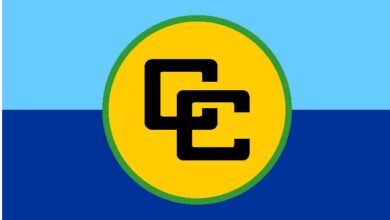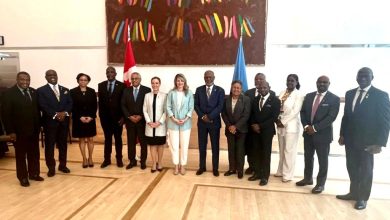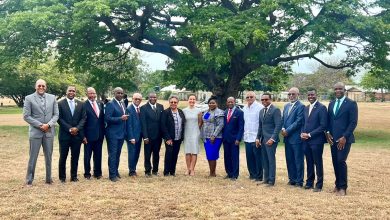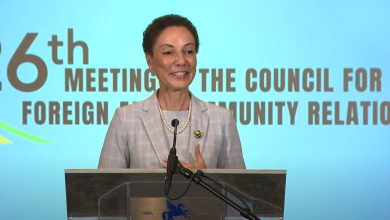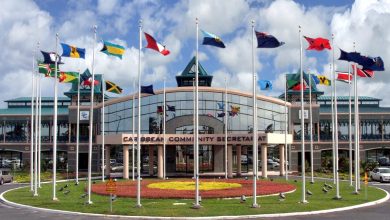The Seventeenth Meeting of the Council for Foreign and Community Relations (COFCOR) of the Caribbean Community (CARICOM) took place in Georgetown, Guyana, on 20-21 May 2014, under the chairmanship of the Honourable Carolyn Rodrigues-Birkett, Minister of Foreign Affairs of the Republic of Guyana.
The Council Meeting was attended by Senator the Hon. Maxine McClean, Minister of Foreign Affairs and Foreign Trade of Barbados; Hon. Frederick Mitchell, Minister of Foreign Affairs and Immigration of the Commonwealth of The Bahamas; Hon. Nickolas Steele, Minister for Foreign Affairs and International Business of Grenada; H.E. Duly Brutus, Minister of Foreign Affairs of Haiti; Hon. Arnold J. Nicholson, Minister of Foreign Affairs and Foreign Trade of Jamaica; Hon. Alva Romanus Baptiste, Minister of External Affairs, International Trade and Civil Aviation of Saint Lucia; H.E. Winston Lackin, Minister of Foreign Affairs of the Republic of Suriname; and Hon. Winston Dookeran, Minister of Foreign Affairs of Trinidad and Tobago.
His Excellency Anthony Liverpool, Director General of the Ministry of Foreign Affairs, represented Antigua and Barbuda, H.E. Nestor Mendez, Ambassador of the Embassy of Belize in Washington D.C represented Belize, Ms. Careen Prevost, Permanent Secretary, Ministry of Foreign Affairs represented Dominica, Ms. Kaye Bass, Director, Ministry of Foreign Affairs represented St. Kitts and Nevis, and H.E. Ellsworth John, Ambassador to CARICOM and Director of the Regional Integration Unit of St. Vincent and the Grenadines represented his country. The OECS Secretariat was represented by H.E. Anthony Severin, Head of International Relations.
Opening Ceremony
Secretary General Ambassador Irwin LaRocque, the Minister of Foreign Affairs of Trinidad and Tobago and Immediate Past Chair of the COFCOR, the Hon. Winston Dookeran, and Minister of Foreign Affairs of Guyana and Chair of the COFCOR, the Hon. Carolyn Rodrigues-Birkett, addressed the Opening Ceremony.
The Secretary-General posited that the annual meetings of the COFCOR were opportunities for the Community’s Foreign Ministers to take stock of the multiple activities undertaken over the past year and to look forward by analyzing the trends, developments and events shaping the external environment. The review this year would take on added importance as the emphasis on prioritization related to the preparation of the Strategic Plan of the Community applied to all Councils.
He noted that the profound systemic changes and resulting transformations in the balance of power, the fast pace of change and the complexity arising from the present multiplicity of centres of influence had rendered the Community’s efforts at foreign policy coordination challenging but even more necessary. Given that multipolar environment, the scope for developing new partnerships had become extremely wide with a diversity of sources of relations, trade, technical cooperation and development assistance. Taking into account the narrowing of interests of its traditional partners, the Community had been actively seeking to widen its own geopolitical space by establishing links with an array of non-traditional partners and forming strategic alliances where there was a convergence of interests. In this regard, the relationship with Latin America had been transformed through the strengthening of bilateral, collective and institutional arrangements and links.
He observed that the Community’s foreign policy agenda was packed with a broad range of issues and preparation for upcoming international conferences. Among these was the Third International Conference on Small Island Developing States in Samoa in September 2014. The Conference theme “Sustainable Development of Small Island Developing States through Genuine and Durable Partnerships” was most apt for the Community which was facing multiple sustainable development challenges. He noted that the Retreat of Foreign Ministers would provide an opportunity to recommend foreign policy approaches and to prioritize.
The outgoing Chair, the Hon. Winston Dookeran, observed that the last meeting of the COFCOR had recognised that “the ground was shifting” and that it had become necessary to address these changes more actively. He noted the challenges faced by the Region, in particular the paradox of economies experiencing fiscal deficits along with surplus liquidity in the financial sector. He also noted that the Community’s voice had become dimmer and the resulting need for a new form of diplomacy in light of the shifting ground brought about by the new global economic and geopolitical realities and the consequent challenges and opportunities. Among these challenges were the structure of integration and not the process of integration itself. However, the new process might require a new structure. Secondly, the international community was operating in a post-globalization period with the emergence of new economic forces. Thirdly, the institutions of the post-global period, international and regional, were engaged in a process of introspection in search of change. Many of these international institutions such as the IMF and the World Bank had an effect on the Community’s Member States. He noted that CARICOM was also in a process of review out of which two issues had emerged. There was a gap in the connectivity between CARICOM Member States and the global architecture was being reshaped with new convergence processes taking place. The Community’s own convergence process would need to be consistent with the global convergence processes. He pointed out that the agenda for this meeting of the COFCOR underlined the need for new pillars and for a new diplomacy. There had been difficulties in arriving at a common foreign policy. However, the Community had increased its foreign policy coordination over the past year and had created the conditions to improve its positioning.
The Hon. Carolyn Rodrigues-Birkett, Chair of COFCOR, welcomed Foreign Ministers and Heads of Delegations and expressed appreciation on behalf of her Colleagues to the Immediate Past Chair of the Council, the Foreign Minister of Trinidad and Tobago, for his expert stewardship over the past year. She underlined the importance of the process of introspection currently taking place within the Community to strengthen its pillars through the drafting of the Strategic Plan. In this regard the COFCOR needed to be ready to respond to the prevailing changes in the hemispheric and international environment and to reposition itself accordingly. In this regard, the deliberations of the Foreign Ministers Retreat would be most useful. She underlined several of the key foreign policy issues that would be engaging the attention of the Community. These included climate change; the unacceptable characterization of CARICOM Member States as Middle Income Countries and the resulting “graduation” and “differentiation” from concessionary financing which did not take into account their diverse vulnerabilities; the foreign trade agenda and the need to improve trade relations which constituted a major foreign policy plank in view of the required efforts to resolve the problems of reciprocity between unequal partners, stringent conditionalities and market access obstacles including visa requirements for Community business persons; joint or shared diplomatic representation; the reform processes at the United Nations with regard to the Security Council and at the OAS where a new strategic vision was being envisioned; and preparations for coming engagements with Third States and for upcoming major international conferences. Among the latter figured the International Conference on Small Island Developing States, the Third International Conference on Financing for Development and the Post 2015 Development Agenda. At these three processes, the issue of mobilizing resources for development from public and private sources would be of critical importance as part of the consideration of the means of implementation and for building resilience.
The Chairperson pointed out that foreign policy coordination did not mean unanimity as there would always be instances of divergence of interests and views. However the Community must maximize its joint voice by subduing individual interests to the extent possible. In this regard the Community had led on a number of issues with a common voice such as the negotiations for the Arms Trade Treaty, Non-Communicable Diseases and the APD. The role played by CARICOM diplomatic representatives in this regard was commended. She also underlined the importance of taking another look at joint and/or shared diplomatic representation and at Community Relations. The need to deepen relations among and between Member States and to take advantage of each other’s strengths was underscored.
In concluding, the Minister noted that diplomacy today had become far more complex and rapid in the digital era and adverted to the principles which continued to guide the Community such as non-interference and the unhindered right of development within a country’s boundaries.
The Retreat
Foreign Ministers took the opportunity of their annual retreat to reflect on CARICOM Foreign Policy in the Changing Global Environment. Their deliberations benefitted from the perspectives of three Caribbean experts in foreign policy, academia and economics – Professor Vaughn Lewis, Professor Mark Kirton and Dr. Justin Ram respectively. They shared with the Ministers their views and insights based on this theme. The respective presentations touched on the present nature of the global political and economic environment as it moved from “two worlds to many political worlds and one world economy”, on the challenges and opportunities for Caribbean Latin-American relations in the changing 21st century environment, and on an analysis of the economic and social challenges facing the Caribbean and impeding its development. They collectively painted a picture of the environment in which the Community operates, the link between economic interests and foreign policy and made a number of geopolitical and geo-economic policy recommendations to address the many challenges identified. Ministers agreed that arising from the presentations and their ensuing deliberations they would pursue the formulation of a strategy paper for the attention of Heads of Government at their meeting in Antigua and Barbuda in July 2014.
Relations with Third States
The COFCOR noted the progress made in the strengthening of relations with a number of Third States since its last Meeting. In so doing, it reaffirmed the importance of CARICOM’s relations with its traditional partners, the United Kingdom, the United States of America, Canada and the European Union and in this context Ministers expressed the desire to have focused discussion with their counterparts in advancing these relations. To this end, they reviewed arrangements for their proposed biennial engagement with the UK Foreign Secretary who will be hosting them at the Eighth UK-Caribbean Forum in London on 16-17 June, 2014.
They also emphasized the importance of having continued engagement at the highest level with the US Government on the CARICOM-US relationship and on issues of political importance to the parties, technical cooperation, trade and investment. In this regard, Ministers spoke of the need to re-establish the practice of regular meetings with their counterpart. In respect of CARICOM-Canada relations, the COFCOR received an update on the progress made in the negotiations of the CARICOM-Canada Trade and Development Agreement and expressed optimism over its successful outcome.
The COFCOR met with the Foreign Ministers of Brazil, New Zealand and Spain and exchanged views on ways and means of enhancing their bilateral cooperation as well as issues of mutual interest on the international agenda. During the course of the meetings, Agreements to advance cooperation arrangements between CARICOM and Spain and New Zealand were signed by the CARICOM Secretary General and the Foreign Minister of Spain and New Zealand respectively.
Community Engagements
Foreign Ministers expressed satisfaction with the outcome of the Third CARICOM-Mexico Summit held in Merida, Mexico, on 29 April 2014 and recalled the productive discussions held between President Peña Nieto of the United Mexican States and the Heads of State and Government of CARICOM which focused on sustainable development, the negative impact of climate change, comprehensive disaster management and the extension to CARICOM Member States of the Mexico-initiated Mesoamerican Infrastructure Fund. They underscored the importance of early follow up actions on the decisions taken at the Summit.
Foreign Ministers reviewed the activities currently being undertaken by CARICOM Member States in commemoration of the CARICOM Japan Friendship Year. They reiterated their desire to ensure that this event is celebrated in a memorable way. In this regard, they agreed to accept the invitation from their Japanese counterpart to host the Third CARICOM-Japan Ministerial Meeting in Tokyo, Japan, on a mutually acceptable date.
In reviewing CARICOM-Cuba relations and the preparations for the Fifth CARICOM-Cuba Summit scheduled to be held in Cuba in December 2014, the Council underscored the importance of the longstanding relationship with Cuba which is characterized by technical cooperation and trade relations and mutual support for each other in multilateral fora. Ministers reiterated the Community’s firm support for the lifting of the economic embargo and expressed concern over the implications of the extraterritorial application of US laws related to the embargo. These implications are important because they may affect the constitutional regimes of CARICOM Member States where the constitution is recognized as the supreme law.
Ministers welcomed the desire of Turkey to further strengthen its relations with CARICOM and looked forward to the continuation of the dialogue with Turkey in this regard when they meet with their counterpart at the First CARICOM-Turkey Consultation and Cooperation Meeting proposed for July 2014 in Istanbul.
Candidatures
The COFCOR continued to emphasize the importance of CARICOM’s participation in international bodies, including through the pursuit of increased CARICOM representation in these organisations. In this regard Ministers endorsed a number of CARICOM candidatures to the UN, hemispheric and other multilateral institutions and agreed to engage in further consultation in relation to the requests by Third Countries for CARICOM support for their candidatures to these bodies.
Multilateral Relations
In relation to the United Nations, the COFCOR assessed the ongoing work towards the Post 2015 Development agenda and emphasized the need to ensure that CARICOM priorities are fully taken into account. In this regard, Ministers signaled the importance of CARICOM’s effective engagement in the Third International Conference on Small Island Developing States to be held in Samoa on 1-4 September 2014; the Third International Conference on Financing for Development; and the UN Climate Change Summit on 23 September 2014. They also reiterated the need to advocate in favour of the issue of Non Communicable Diseases (NCDs) remaining a priority on the global development agenda.
Foreign Ministers discussed the significance of CELAC and emphasized the importance of the full participation of CARICOM in the integration process, notwithstanding resource constraints faced by Member States.
The COFCOR received an update on the issues of importance before the Organisation of American States (OAS). Ministers reiterated their commitment to the work of that body and looked forward to discussions to be held at the forthcoming Forty-Fourth General Assembly of the OAS under the theme “Development with Social Inclusion” to be held in Asuncion, Paraguay, on 3-5 June 2014. The Ministers also met with representatives of the Special Committee of Ministers of Foreign Affairs of the Conference of State Parties of the American Convention on Human Rights led by the Minister of Foreign Affairs of Ecuador whose mandate is the promotion of the universalization of the Inter-American Human Rights System.
In discussing the Association of Caribbean States (ACS), the COFCOR recalled the Sixth Summit of the ACS hosted by President Peňa Nieto in Merida, Mexico, on 30 April 2014, and underscored the need for CARICOM to continue to play a vital role in that organization especially as it pertains to advancing the work of the Caribbean Sea Commission (CSC).
Foreign Ministers were updated on sub-regional organizations to which some CARICOM Member States belong. Reaffirming the considerable potential for collaboration between CARICOM and the Central American Integration System (SICA), Foreign Ministers underlined the need for the Secretariats of the respective organisations to work towards advancing the relationship and implementing the Plan of Action.
In its capacity as the Pro Tempore President of UNASUR, Suriname briefed the COFCOR on ongoing developments within that organization.
Foreign Ministers acknowledged the contribution that ALBA continues to make to the socioeconomic development efforts of a number of its members.
Border Issues
Belize-Guatemala
Foreign Ministers expressed support for the Road Map signed on 24 January 2014 by Belize and Guatemala and by the Secretary-General of the Organization of American States (OAS) as witness, which aims at strengthening bilateral relations conducive to setting a new date to hold the referendum in both countries in accordance with the Special Agreement. They called on the international community to support the efforts of both countries and the OAS in this endeavour and reiterated their support for both countries in their abiding commitment to the Special Agreement.
Foreign Ministers expressed their continued support for the territorial integrity of Belize.
Guyana-Venezuela
Foreign Ministers recognized the important role played by the late Professor Norman Girvan as the Personal Representative of the United Nations Secretary General in the Good Offices Process. They noted that Guyana and Venezuela remained committed to that Process with a view to reaching a peaceful solution to the claim by Venezuela that the Arbitral Award of 1899, that definitively delimited the boundary between the two countries, is null and void.
Foreign Ministers reiterated support for the maintenance of the sovereignty and territorial integrity of Guyana.
STATEMENTS
The COFCOR agreed to issue the following statements:
Condemnation of Acts of Terrorism in Nigeria
CARICOM Foreign Ministers reiterated their strong condemnation of all acts of terrorism including the abduction of approximately 300 teenaged girls from their school in northeastern Nigeria and the recent bombings that caused a large number of innocent civilian casualties. They also acknowledged that terrorism is a transnational concern and, noting the commitment of the Nigerian Government to address the terrorism threat, welcomed the international support for the efforts to help find and rescue the abducted schoolgirls. Foreign Ministers expressed their support for the Press Statement on Attacks in Nigeria issued by the President of the United Nations Security Council on 9 May 2014 (SC/11387) condemning in the strongest terms the terrorist attacks and the abductions of schoolgirls committed by Boko Haram.
The Dominican Republic Draft Naturalization Law
The COFCOR took note that a naturalization bill drafted by the President of the Dominican Republic in response to the Constitutional Court ruling on nationality of September 2013 which stripped nationality from some 200,000 Dominicans, a majority of them of Haitian descent, rendering them stateless, had been adopted by the Chamber of Deputies without amendment and sent to the Senate for adoption. The Community will review the implications of the bill for those rendered stateless by the Constitutional Court ruling.


